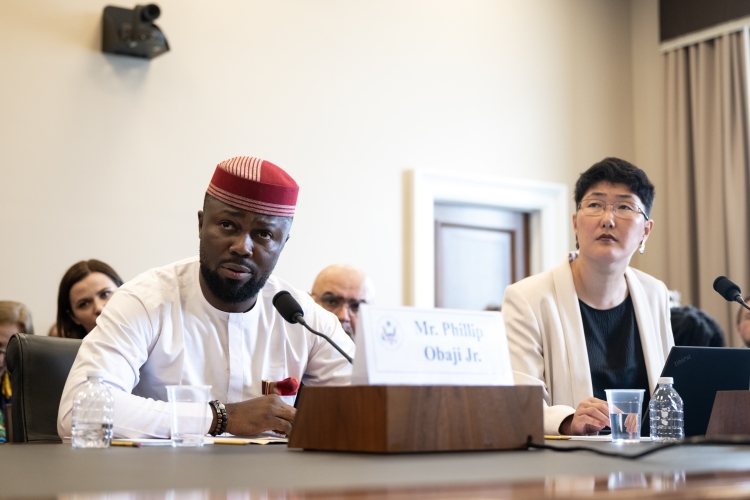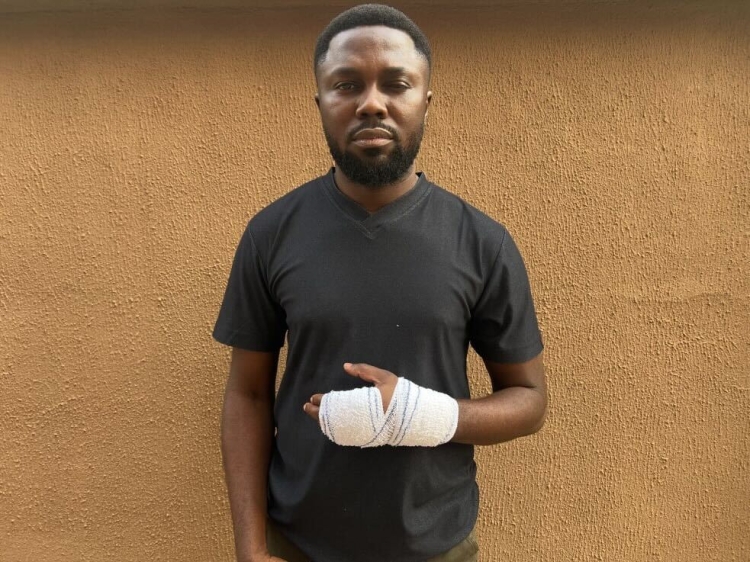Philip Obaji recently testified in Washington, DC, before the Commission on Security and Cooperation in Europe about reporting he did as an ICFJ Jim Hoge Reporting Fellow, bringing attention to the brutal actions of Russian paramilitary forces in the Central African Republic (CAR) and the region.
Obaji, a correspondent for The Daily Beast based in Nigeria, told members of the Commission about his investigation last year into a massacre in Koki, a mining village in northwest CAR. So-called “military instructors” operating under the Russian Ministry of Defense killed at least 50 villagers, Obaji said.
The journalist testified that the 16 witnesses he interviewed all said the same thing: “Russian paramilitaries slaughtered their friends, colleagues, family members and neighbors simply because the Russians wanted to secure access to Koki’s gold mine.”
“[The story] became an obsession for me – all the more because the victims were ordinary people who had done nothing wrong,” said Obaji, at the hearing on the history of Russian colonialism and its modern-day manifestations.

This and two other reports on abuses by mercenary forces in CAR were made possible with grant funding through the ICFJ Hoge Fellowship.
Reporting on Atrocities
Obaji in his testimony also highlighted heinous attacks on women and girls in the region. He described interviewing a dozen girls who told him they were lured to a Russian military base, where they were drugged, raped and forced to take contraceptives. Other victims told him how Russian paramilitaries gang raped them at gunpoint in front of family members, on their farmlands.
In Mali, Obaji interviewed women who also had experiences of abuse at the hands of Russian forces.
“The Wagner group continues to operate in the country on behalf of Vladimir Putin’s regime, helping government forces in central and northern Mali carry out raids and drone strikes that have killed scores of civilians, including many children,” Obaji said.
As in CAR, Russian activities in Mali have exacerbated longrunning lawlessness, violence, human rights abuses and corruption, Obaji testified. The military dictatorships in Mali – as well as in Burkina Faso and Niger – have created a vacuum for Russian influence, he said, as much of the world has cut ties with those countries.
The Dangers
Obaji endures great risks to report on Russian abuses in Africa. In 2022, local Wagner Group recruiters circulated Obaji’s photo in chat groups, labeling him “an agent of the West” who should be arrested or killed.
While reporting in CAR last December, government forces arrested and beat him, as well as confiscated his phone and camera – an experience he has detailed. Days later, rebels in CAR accused Obaji of spying on them and held him for hours.

Despite the attacks he has experienced and risks he faces, Obaji said he remains committed to his work.
“No amount of intimidation was going to stop me from continuing my investigation,” Obaji testified. “After the soldiers released me, I crossed into Cameroon, bought new equipment and returned to the CAR to finish the work I had started.”
Obaji is currently working as a producer for an Al Jazeera documentary on Russia’s disinformation campaign in West Africa. He said the film reveals how Russia gets false reports into media outlets in the region. A second documentary he is producing, with Radio Free Europe, focuses on human rights abuses by Russian paramilitary forces in West and Central Africa.
Obaji was joined at the Sept. 18 hearing by three fellow witnesses: Botakoz Kassymbekova of the University of Basel, Timothy Snyder of Yale University, and Maria Vyushkova, a Buryat activist and scientist. Watch the full hearing. Read Obaji’s coverage for The Daily Beast.